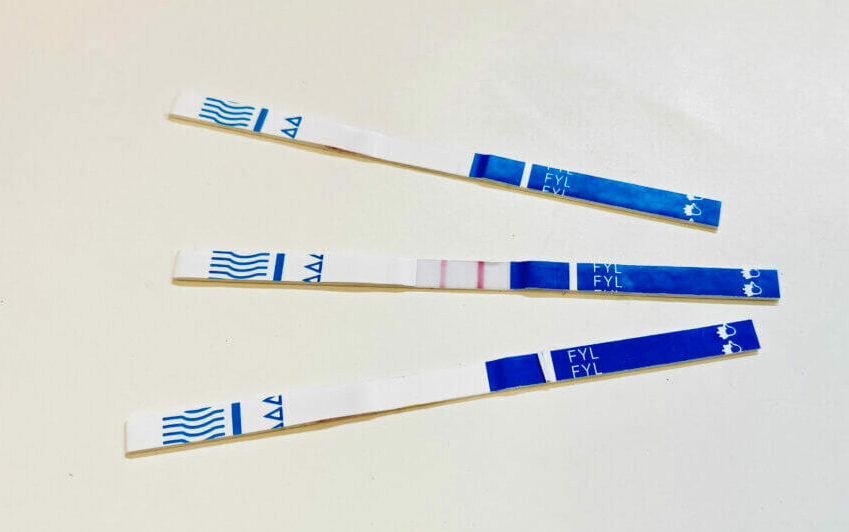With overdose deaths on the rise, and a growing need to assist Kentuckians battling substance use disorder, the General Assembly has an opportunity to move the state in a positive direction this session. House Bill 353 (HB 353), sponsored by Representative Kimberly Moser, would help save the lives of Kentuckians by decriminalizing the possession of fentanyl testing strips, which can detect the presence of the deadly synthetic opioid in other drugs and prevent overdose.
Fentanyl is the leading cause of overdose deaths in Kentucky, and nationwide. In 2021, Kentucky saw a 14.5% increase in overdose deaths from the previous year, with the loss of 2,250 Kentuckians, and nearly 70% of these overdose deaths were caused by fentanyl. If HB 353 passes, providers could distribute testing strips, allowing people who use drugs to avoid fentanyl and reducing overdose deaths in Kentucky.
Fentanyl testing alerts people that fentanyl is present in other drugs, and are widely distributed by agencies in some states
Because fentanyl looks like many other drugs, it is often mixed with other substances, making it impossible to know if fentanyl is present simply by looking at a substance. But fentanyl testing strips are an effective, inexpensive way of providing this lifesaving information.
Fentanyl testing strips are small pieces of paper that can detect the presence of fentanyl in different kinds of drug compounds, regardless of drug form (pill, powder, or liquid). The strips, when added to a small amount of water, produce a distinct “positive” pattern to alert the tester that fentanyl is present. Ideally, once learning fentanyl is present, the tester will not consume the substance, and avoid an overdose.
Health departments and police stations around the country even pass out the testing strips, which have already been decriminalized in a majority of states, including Tennessee, North Carolina, Alabama, Ohio and Louisiana. Decriminalizing testing strips and making them readily available will reduce harm and increase the likelihood that a person will be able to seek treatment and recover.
Research shows testing strips can save lives
Because widespread use of fentanyl testing strips is relatively new, scientific evidence on their effectiveness is still emerging. But early research shows that the availability of fentanyl testing strips can save lives.
One study, focused on whether people who use drugs would use the testing strips, found that 95% of study participants – all young adults engaging in the use of opioids – were willing to use testing strips when taught proper use. During the same study, 70% of participants found that their drugs were contaminated by fentanyl. Without testing strips, any of those participants could have experienced an overdose.
The use of testing strips can also influence positive behavior changes. A North Carolina study found that use of testing strips resulting in a positive reading led to “changes in drug use behavior and perceptions of overdose safety.” Participants in this study whose drugs tested positive for fentanyl were more likely to test their drugs prior to use when they had not been doing so before. Participants also reported they were more likely to use the substance less than usual, and 77% of participants said use of the testing strips made them feel “more able to protect themselves from overdose.”
Testing strips are drug paraphernalia under existing law but HB 353 would change this
Under existing law, fentanyl testing strips are criminalized as drug paraphernalia, which is a Class A misdemeanor, punishable by up to one (1) year in jail, or a $500 fine. As a result, substance use treatment and health care providers that have access to these testing strips are unable to possess and distribute them without violating current law. Passage of HB 353 would remove this barrier, and allow these organizations to reach more Kentuckians.
HB 353 proposes the following:
- Provides that testing strips themselves will not be classified as drug paraphernalia; this includes testing strips for fentanyl and other substances.
- Ensures that any trace amount of a drug found on a testing strip is not classified as drug paraphernalia.
- Creates a Fentanyl Education and Awareness Campaign co-led by the Cabinet of Health and Family Services and the Cabinet of Justice and Public Safety.
As Kentucky continues to fight the opioid epidemic, the General Assembly should move forward with the passage of HB 353, which would save the lives of Kentuckians by simply letting them know if fentanyl is present.



